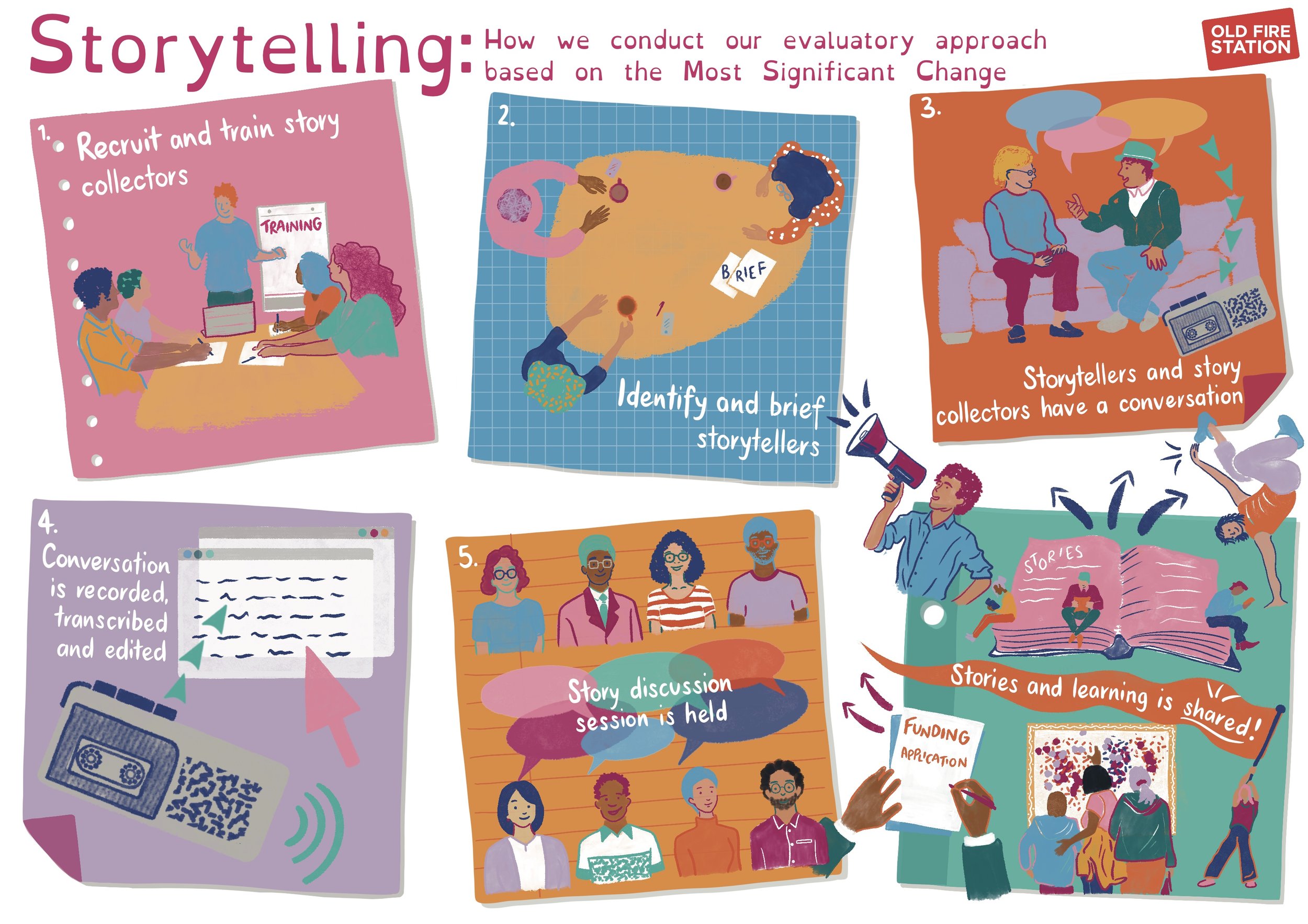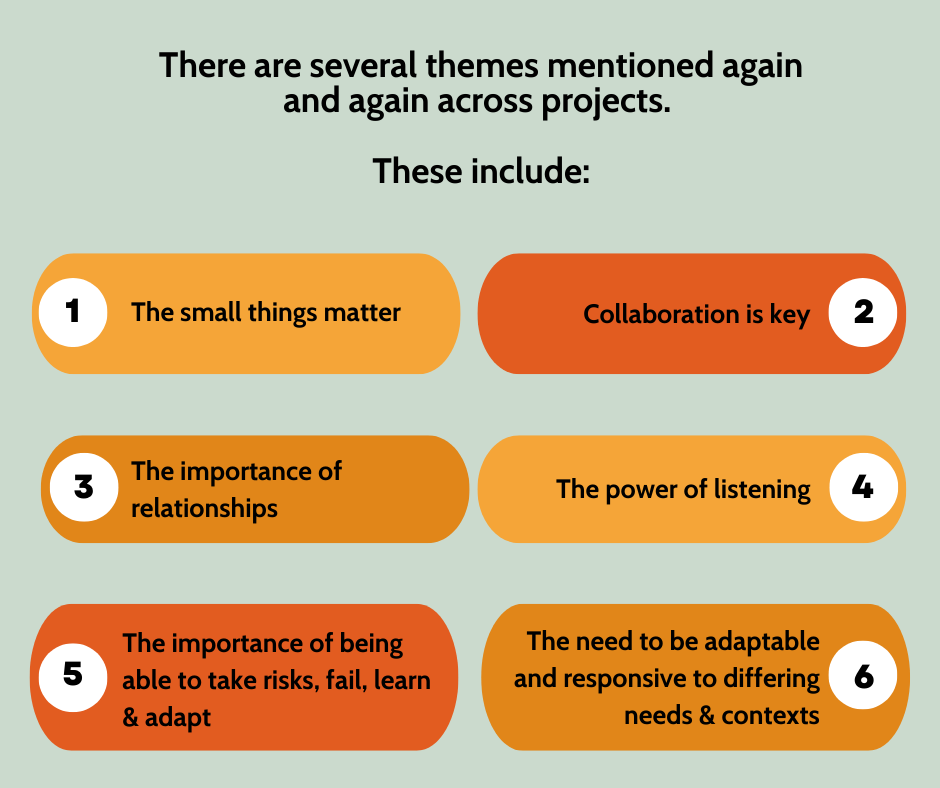As part of the Meaningful Measurement Action Inquiry, the Old Fire Station have been working in collaboration with over 60 partners across the county and beyond to experiment with Storytelling. In September 2022, we brought partners together to share their experiences of Storytelling so far and discuss what we’ve learned:
How is the approach being used?
What benefits and challenges have we experienced?
And how can we take it forward?
STORYTELLING TO DATE
STORYTELLING EVALUATION METHODOLOGY
Storytelling is an evaluation methodology based on the Most Significant Change Technique (MSC). It involves collecting stories from people about their experience of a project or area of focus, and then bringing people together to discuss the stories collected and what we can learn from them. You can read more about the approach and how it works here.
PARTNERS
Since 2019, over 120 stories have been collected, over 60 partners have been trained in using the approach, and many more have been involved in telling stories and attending discussion sessions.
The graphic below shows the breadth of partners involved, including institutions, service providers, and community partners. The top tier shows partners who have led a Storytelling evaluation (independently or in collaboration with OFS). The next lists partners who have been actively involved in a partner project as a storyteller or collector. In the third section are those who have attended trainings hosted by partner organisations (but may not have put it into practice), and the bottom tier includes those who’ve engaged in a lighter touch ways (such as attending a discussion session).
HOW IT’S BEEN USED
Across this work there are some key area of focus. Highlighted pink are partners involved in health and wellbeing , in orange are partners involved in housing and homelessness, in turquoise are partners involved in voluntary action, in red are cultural partners.
Within these areas of focus, Storytelling has been used in a variety of different ways, including:
To evaluate a specific project: Stories collected over several years and discussed at key junctures to evaluate the impact of the No Recourse to Public Funds project, led by Connection Support, Asylum Welcome, Oxfordshire Homeless Movement and Aspire.
To evaluate the impact of a service on an on-going basis: Elmore Community Services – stories collected from clients leaving the service to understand what support has meant for them personally. Stories are collected on a rolling basis.
By a network of partners interested in learn together about a shared area of focus: e.g. Oxfordshire Storytelling Project: partners involved in the Oxfordshire Comms group were trained in the approach. They collected stories from staff, volunteers and clients about their experience of mental wellbeing support and brought together wider partners to discuss the stories and learning. Oxford Together – used Storytelling to learn from Oxford’s voluntary response to Covid, led by Oxford Hub in collaboration with the City Council.
To evaluate the impact of an organization or network: e.g. (LEAF) Lived Experience Advisory Forum collected stories from people about their experience of being involved with LEAF.
LEARNING
REFLECTIONS ON PARTNERS USING STORYTELLING
WHAT ARE THE BENEFITS OF USING STORYTELLING?
Centres the experiences of those most involved
People feel valued and cared for, and share experience on their own terms
It amplifies people’s experiences in their own voice and words
Meaningful process
It build relationships and trust
Telling your story can be a therapeutic process
It makes space for reflection
It’s collaborative and involves lots of people at every stage
Creates rich, versatile learning
It creates human and engaging stories which bring evaluation to life
It allows for unexpected outcomes, and doesn’t put boundaries on what can be discussed
It demonstrates complexity, and contextualizes impact within people’s lives
It ensures learning starts with listening
It helps with reporting and explaining work to funders
It works on many levels – building relationship, collaboration, comms
It’s recognised by partners across the city
WHAT’S BEEN HARD?
WHAT’S NEEDED FOR IT TO BE SUSTAINABLE GOING FORWARD?
Capacity, support and resourcing
Devoting time to it – e.g. a set day to focus on collecting stories
Sufficient funding and resourcing
Support and recognition from funders, commissioners and decision makers
Safe spaces for collecting stories
Training and capacity in transcribing and editing
Capacity for taking stories to decision makers, sharing amongst networks, wider advocacy
Having a storytelling lead to hold the process, and training from OFS in how to do this
Demonstrating its value and impact
A way to explain to decision-makers that it’s different from writing case studies
Ways to measure whether the process is successful, and what success looks like
Ways of demonstrating the value of Storytelling on many levels - not just evaluation - to help justify time and resource.
Complementary approaches
Understanding other approaches that can be used alongside Storytelling
HOW COULD IT BE IMPROVED & DEVELOPED?
Adapting and evolving
Develop lighter touch ways of using it that can be more easily embedded – for instance micro stories feeding into ongoing analysis, or one-off stories that don’t have to result in a discussion session.
Include questions about what didn’t go well, or what still needs to change to capture the negatives
Have Storytelling advocates within organisations who can support storytellers and collectors
Experiment with group storytelling sessions
Adapt to make more inclusive for neurodiverse adults and children and young people
Make it possible for people to volunteer to tell their story
Collaborating
Share learning and capacity across organisations
Create opportunities to hear about examples of how it’s been used in other organisations
Create a network of storytellers and collectors who can learn from one another
Embedding
Make it an on-going process, not just centred around a project e.g. at regular reviews and when staff leave the organisation
Recognise the value of stories of personal change and the process in and of itself, rather than pigeonholing it as evaluation.
Sharing the stories and learning
Develop how stories are used for comms and awareness raising campaigns
Incorporate contextual analysis to add an extra layer of understanding
See it as a journey, the story is not the end. What needs to change and happen next?
Make Storytelling more visible so that funders and decision makers see its value
Involve artists in creatively sharing stories
HOW CAN WE COLLABORATE & SHARE RESOURCES?
Collaborative projects and learning
Collaborate around wider issues and common areas of focus e.g. Cost of living crisis
Use and amplify common themes
Create a storyteller exchange – e.g. teller from one provider talking to another
Place-based stories - collate stories from across projects. Capture the heritage of a city in a way that moves beyond rigid historical stories and methods.
Collaborative resources
OFS train a group of roving story collectors from across organisations
Pool story collectors to collect from one another’s projects
Trade time for training
Partners with space to offer for Story collecting conversations
Devolve the process to other organisations (so less contingent on OFS)
Bringing partners together
Create peer support spaces that bring together people putting it into practice
Create a web-based forum
Share a directory of people trained, so partners can contact each other
Support grassroots groups and campaigning movements to be involved
Sharing stories and learning
Share findings and stories across organisations
Create a library of stories that can be searched by theme
Consider together how learning can be used to influence funders and decision makers
Share how stories are shared – e.g. visual, photography, audio, video
Connect to other places in the country using Storytelling
More visibility around who is involved
WHAT CAN FUNDERS & COMMISSIONERS DO TO SUPPORT?
CONCLUDING THOUGHTS & NEXT STEPS…
Over the past few years, the breadth of partners across the city using Storytelling to evaluate impact and amplify voices has continued to grow. These conversations brought to light the momentum there is around continuing to use and embed Storytelling, as well as the scope for more collaboration – whether that be through coming together to learn and reflect, or leading learning projects across common priorities and areas of focus. Immediate actions to help support more collaboration around Storytelling include:
Create a Storytelling mailing list and online stories library
Share amongst partners a list of who has been trained in Storytelling
Hold future gatherings for Storytelling partners
Share priorities discussed with commissioners and funders
Host Meaningful Measurement events at the Marmalade Festival in April 2023
Some of the resounding challenges around putting Storytelling into practice spiral back to resource, capacity, expectations from funders and decision makers, and the value placed on learning. How can we use the collective momentum around Storytelling to influence some of these wider challenges? What can the Meaningful Measurement Inquiry and Marmalade do to move the conversation forward? We’d love to hear your thoughts.
The session showed the wealth of ideas around how Storytelling could be adapted and taken forward. At OFS we are currently reflecting on how we can embed Storytelling more within our work – from reflective questions at staff away days, to collecting stories on a more on-going basis. We are also revisiting the approaches we use alongside Storytelling to learn and evaluate. We look forward to hearing how partners take Storytelling forward in ways that resonate for them and continuing to learn together.
Written by Sarah Cassidy, November 2022.







